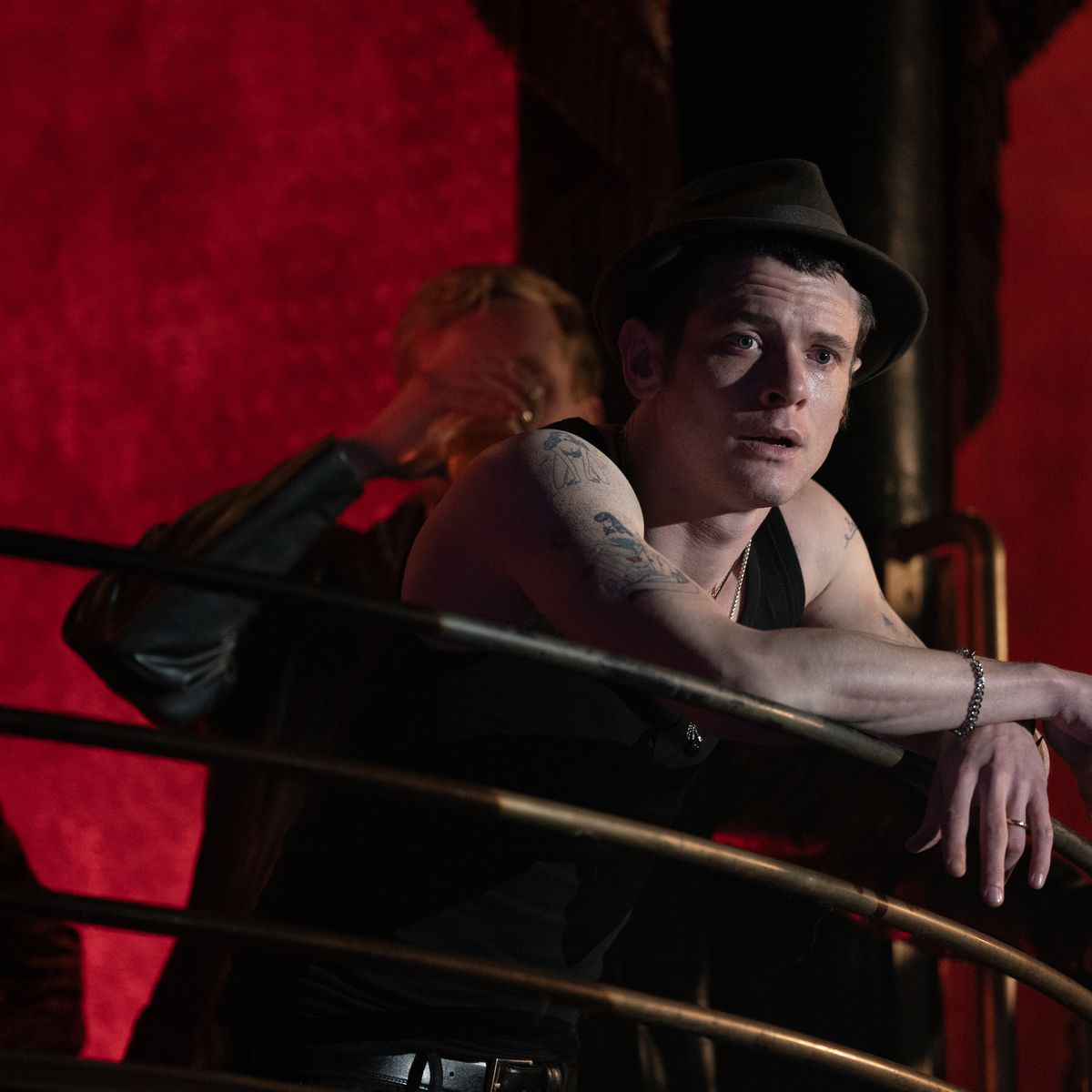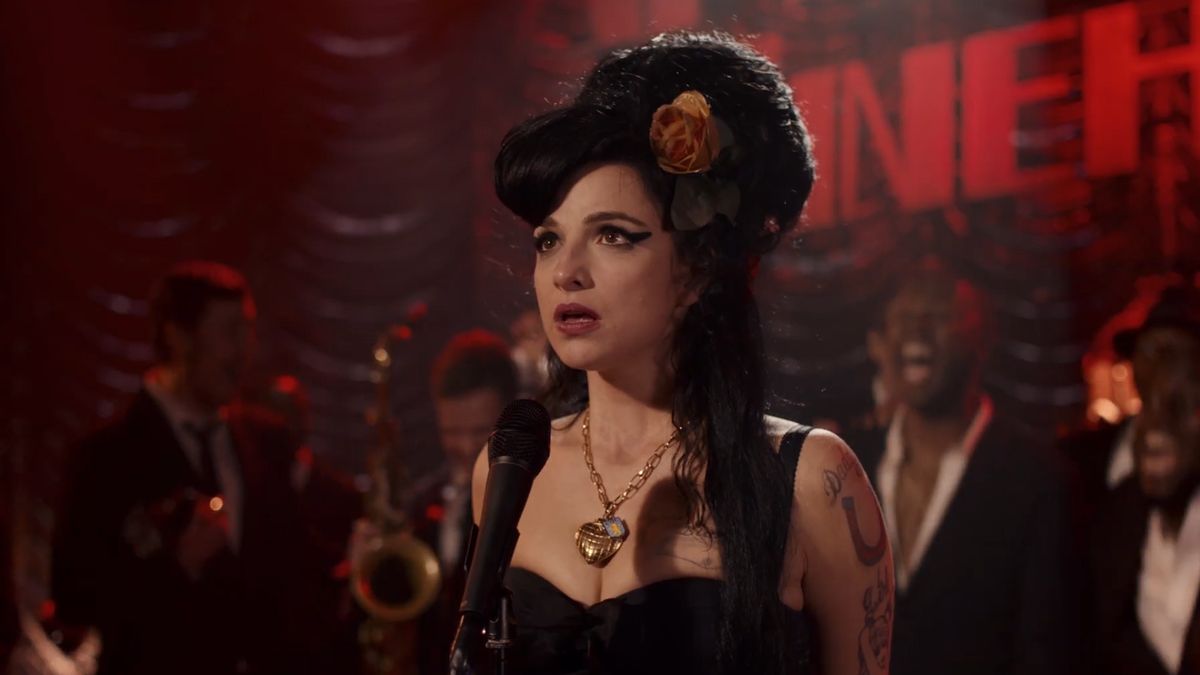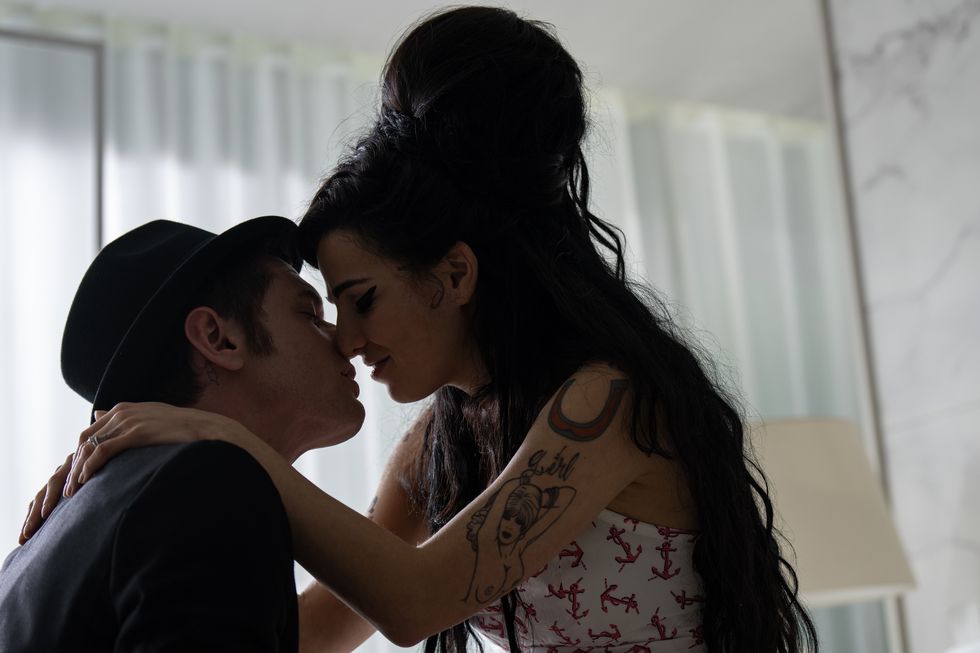Why would anyone want to play Blake Fielder-Civil? That is my question for Jack O’Connell, who is doing exactly that in the upcoming Amy Winehouse biopic, Back to Black. Fielder-Civil, one-time video assistant and, more problematically, one-time husband of Winehouse: a tabloid bad boy inextricably linked to a doomed icon. In the 13 years since Winehouse’s death, the singer’s reputation has soared, in part thanks to re-evaluation of how society treats female pop stars, while his has remained low. “I agree, that perception is out there,” the 33-year-old actor tells me in a London hotel room in late March. “And it’s not fair for me to say whether that’s unfair or fair. All I can say is I don’t agree that you can possibly know someone just based on what’s in the media or the press. You can’t get the measure of a man without meeting him.”
O’Connell pre-empts the obvious next question: “So I met him.”
Although Fielder-Civil was initially “very wary”, O’Connell says that the conversation defrosted by the end of their afternoon together. “It was just two lads hanging out one Saturday afternoon,” he says. “I felt I had a lot in common with him.” Like what? Football, for one. O’Connell, who was born in Alvaston, supports Derby County, while Fielder-Civil, from Northamptonshire, opted for Millwall. (“Both are shit, so neither of us really get our kicks out of it: we just fucking suffer our respective teams,” he notes.)
For O’Connell, the meeting was about reassuring Fielder-Civil: “I wanted him to understand this wasn’t a tabloid piece, and this wasn’t scandal driven, to show him it was going to be handled in earnest.” In turn, Fielder-Civil told the actors about conversations and memories from that intense period and even provided a playlists of tracks he would listen to back then – The Ramones, The Specials, “one or two really fucking heavy metal pieces”. And, O’Connell recalls, his face “lit up” when he talked about Winehouse.
I am not sure if people’s faces will light up when they see Back to Black, which is directed by Sam Taylor-Johnson and stars Industry’s Marisa Abela in the lead role. The film, which is out today and features Abela’s vocals, is a celebration of Winehouse’s life but also charts her lowest moments: invasive paparazzi, eating disorders, rehab stints. The lead performances are compelling, but the subject matter is often depressing. O’Connell, like most of Britain, has a lot of thoughts about Winehouse. How we made her a star and ripped her to pieces, or as the actor puts it, “this fucking need to cut people down.”
Unlike the rest of us, O’Connell has some experience of living in the public eye. A promising start in football was put on hold by injuries, and hopes of an army career were dashed by a juvenile criminal record. Drama lessons ignited an interest in acting: a part in Doctors and stage roles followed. At 15, he was cast as volatile gang member Pukey in This is England by Shane Meadows. Three years later, he played the self-destructive Cook in E4’s star-making, teenage touchstone Skins. In 2014, he landed the lead role in WWII true-story survival movie Unbroken (which also happened to be Angelina Jolie’s directorial debut).
O’Connell became a mainstay on-screen and off, frequently in the press for his partying and rumoured girlfriends. “Having some awareness, first hand accounts of witnessing that level of press attention and what it might result in for the individual, because they are getting hounded, I guess it did inform me,” he says. “Those scenes where we were reconstructing that are incredibly profound. You literally see Marisa hit the deck, and no one’s trying to help her up. They’re just trying to get a shot. You think, ‘Well, that’s fucking inhumane.’”
The love story is so central to the film that it might as well be called Back to Blake. In the film, Winehouse and Fielder-Civil meet at a pub – where else? – to play snooker and tunes on the jukebox. Fielder-Civil, with his trilby and dance moves, is an easy figure to fall for and Amy inevitably swoons. Perhaps the audience will too: anyone familiar with O’Connell’s knack at playing volatile young men will not be surprised to discover he brings a similar vibe to this film. Perhaps he was able to draw from his own life: “He just reminded me of the type of geezer that I’d encountered back in this era,” O’Connell says. “The music that was around at the time, the type of parlance, the type of clobber you were wearing, just the whole fucking zeitgeist.”
The “whole fucking zeitgeist” to which O’Connell refers is, of course, the Noughties in London. Although he was filming Skins at the time in Bristol, he was often down in the capital. When he could legally drink, O’Connell says he would go out in Camden and “just feel that whole movement”: “There was a lot of Fred Perry, a lot of Dr. Martens, a lot of trilby hats, a lot of fags.” (A slightly rueful “yes” when I ask if he indulged in any of that fashion.)
This was Frank-era Winehouse, and O’Connell was excited to be part of Skins, which promoted new bands. Sitting in this dimly-lit hotel room, wearing all white and sipping orange juice, he looks more like a yoga teacher than a pub regular, though his self-awareness is intact. “I feel like an old fart sat here like reflecting on a bygone era,” he smiles. Does it really feel that distant? He nods, referring to Back to Black as – hold your breath if you came of age during this time – a “period film”. Either way, he is “glad to have drawn a line under my 20s. Some people never do”.
O’Connell’s interpretation of Fielder-Civil on-screen is purposefully loose. The characters age throughout the film – he goes to prison, she goes to rehab, they marry and divorce – and though there’s more footage and photographs of the older man, O’Connell had to “invent” the idea of him as a younger person. “There was a lot of joy for me going, ‘Alright, there’s a lot more room for manoeuvre with my portrayal of Blake’.” O’Connell, as energetic in person as he is on screen, heaps praise on both his director (“I always felt very free in front of Sam’s cameras”) and his co-star (“She just nails the essence”).
Inevitably our conversation leads back to Winehouse. O’Connell saw her once at Glastonbury. “I was there but I wasn’t necessarily there, if you know what I mean,” he says. “She was great, as far as I remember.” Recently, his girlfriend has been playing a lot of her music in their flat in London. His favourite song is “Tears Dry On Their Own” though he loves her ska covers too.
While researching this interview, I looked up Fielder-Civil’s appearances on YouTube. He has mellowed in recent years. Speaking on Good Morning Britain on what would have been Winehouse’s 40th birthday, he says: “I’m the only person within that story who has ever held any accountability.” The comments underneath are a mix of blame and sympathy. Time moves on, maybe opinions change. Whatever your thoughts on this biopic – too much, too soon? – it’s undoubtedly going to bring up these discussions again. Is O’Connell prepared for that? “I think there might be an appetite to want to see the fucking worst version of this story, but I don’t think this is it. I don’t think this is the film for them. What we’ve succeeded in doing is trying to remind people why she was fucking phenomenal.”
Does O’Connell think Fielder-Civil will watch the film? No idea. “He hasn’t told me, so he’s either seen it and never wants to speak to me again or just hasn’t fucking seen it yet,” the actor says, with a characteristic glint in his eye. “I hope it’s the latter.”
‘Back to Black’ is in cinemas 12 April
Henry Wong is a senior culture writer at Esquire, working across digital and print. He covers film, television, books, and art for the magazine, and also writes profiles.














